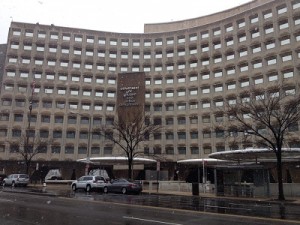 The FHA loan program is a balancing act to remain competitive in the market, mitigate risk to its insurance fund and fill the niche role for which it was designed. FHA loans have changed a great deal even since I began my career as a loan officer in 2001. This is not your father’s FHA loan!
The FHA loan program is a balancing act to remain competitive in the market, mitigate risk to its insurance fund and fill the niche role for which it was designed. FHA loans have changed a great deal even since I began my career as a loan officer in 2001. This is not your father’s FHA loan!
FHA Loans are NOT Low-Income or Affordable Housing Loans
This is a common misconception about FHA buyers that we run into frequently. Because the Federal Housing Administration (or FHA) is a division of the Department of Housing and Urban Development (HUD), people associate FHA loans with low-income loans, subsidized “Section 8” housing and Affordable Housing programs.
This is not the case.
In order for a buyer to qualify for an FHA loan, he/she has to meet income guidelines that are nearly the same as “conventional” Fannie Mae loans. FHA does not provide subsidies for these loans; the buyer has to qualify on his/her own merit.
FHA does not have minimum or maximum income limits and only verifies if the buyer earns sufficient money to meet his/her financial obligations.
More than 20% of FHA’s loans are in excess of $200,000 and nearly 40% are in excess of $150,000. “Low-income” borrowers would not qualify for loan sizes this large.
FHA Loans are Not for People with “Bad Credit”
FHA has always been more lenient with its credit-qualifying criteria than Fannie Mae – this is one of the niche areas for which the program was designed. But it does not offer loans to folks with “bad credit”. In fact, roughly 25% of FHA borrowers have credit scores of 720 or better; these are commonly referred to as “Tier 1” or “A+” credit ratings.
Like Fannie Mae, FHA has minimum credit requirements and an automated underwriting system. In order to qualify for a loan, buyers must meet FHA’s credit standards, which have become stricter since 2007. There are two primary differences between FHA and Fannie Mae:

- FHA will allow borrowers with no credit scores. FHA understands that there are folks who choose to not use traditional credit such as car loans and credit cards. Instead, they run on a cash system. If this is the case, these folks would not have credit scores. Instead, FHA examines the buyers’ non-traditional credit by obtaining letters of payment history from other sources such as electric companies, insurance companies, rent receipts, phone companies, etc. These buyers are examined very closely by the lender.
- Fannie Mae does not allow loans to buyers who are not approved by the automated underwriting system; FHA will if it can be shown that the buyers meet FHA’s credit standards. FHA understands that life-changing events occur which can affect a person’s ability to pay their bills. Such “life events” include car accidents, serious illness or fire. If it can be shown that a life event was the cause of the low credit rating AND that it is unlikely to occur again (e.g. the illness is cured or won’t return) then FHA may still approve the loan. Again, the buyers are very closely examined by the lender.
The FHA Loan Process is Not Tedious
I just had this conversation with mortgage loan officers yesterday. They mentioned that many real estate agents – even very good agents – still hold on to the idea that the FHA loan process is more tedious and takes longer to close than conventional loans. One loan officer noted to me that his lender is closing FHA loans in less than 30 days.
This misconception is lingering from the days when FHA appraisals typically found faults in the home that required curing prior to closing. FHA appraisers were required to to complete a Valuation Conditions (or “VC”) sheet as part of the appraisal. It was a checklist for the appraiser to search for defects in the property. This form was removed as a requirement in 2005 making an FHA appraisal virtually the same as one for Fannie Mae.
Top Photo Credit: (c) Can Stock Photo / imphot
Approved Photo Credit: (c) Can Stock Photo / Arcady







 Yesterday, August 26, 2014, HUD modified its procedure for interest charges when an FHA loan is paid off. As of January 21, 2015, lenders will only be allowed to collect interest from a borrower up until and including the date on which the loan balance is paid in full.
Yesterday, August 26, 2014, HUD modified its procedure for interest charges when an FHA loan is paid off. As of January 21, 2015, lenders will only be allowed to collect interest from a borrower up until and including the date on which the loan balance is paid in full. As FHA/VA Condominium Project Consultants, we do not typically get involved with the “loan level” side of things. Our primary objective is to assist condominium projects to get on FHA’s and the VA’s Approved Condominiums List.
As FHA/VA Condominium Project Consultants, we do not typically get involved with the “loan level” side of things. Our primary objective is to assist condominium projects to get on FHA’s and the VA’s Approved Condominiums List. The Federal Housing Administration, or FHA, is a mortgage loan insurance provider. FHA is housed with The Department of Housing and Urban Development, or HUD. It has a set of guidelines for housing loans and if a borrower meets these guidelines, FHA will insure the loan to protect the lender against losses. FHA is not a loan provider and does not lend money for home purchases.
The Federal Housing Administration, or FHA, is a mortgage loan insurance provider. FHA is housed with The Department of Housing and Urban Development, or HUD. It has a set of guidelines for housing loans and if a borrower meets these guidelines, FHA will insure the loan to protect the lender against losses. FHA is not a loan provider and does not lend money for home purchases.